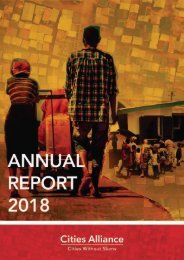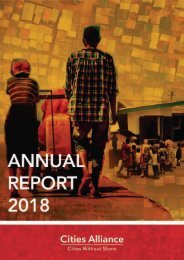Create successful ePaper yourself
Turn your PDF publications into a flip-book with our unique Google optimized e-Paper software.
Bangladesh<br />
A final workshop was held in Dhaka to conclude Campaign City activities for two<br />
cities, Narayanganj and Sylhet, in November <strong>2018</strong>. Both cities presented their action<br />
plans for the respective priority areas identified through the Campaign City process.<br />
Narayanganj chose to focus on providing key services to women workers in the<br />
garment industry, including a women’s centre and digital centres to help them pay<br />
taxes, among other necessities.<br />
Sylhet prioritised medical waste management, in the hopes of becoming a hub<br />
for the medical industry in Bangladesh. The city has taken strong ownership of the<br />
activities identified through the Campaign <strong>Cities</strong> initiative, and it is ready to commit<br />
funding from its own budget for some of the activities, including for an incinerator<br />
plant.<br />
Ghana<br />
In Ghana, the campaign city activities remain ongoing in two cities. The city of<br />
Cape Coast is focusing on how improved solid waste management and sanitation<br />
services can improve the tourism sector, while Agona Swedru is studying the local<br />
agro-processing sector to see how facilities, support services and goods can be<br />
improved to benefit local economies and strengthen regional value chains. The<br />
JWP is currently undertaking household and business surveys in Cape Coast and<br />
Agona Swedru to inform the local assessment report, which will eventually lead to<br />
the formulation of policy recommendations and action plans.<br />
In support of the campaign cities initiative in Ghana, UNCDF – a member of the<br />
JWP – is developing and applying a diagnostic tool to support the cities with<br />
modelling their local finances to get a clearer picture of their capacities to invest in<br />
public goods and services. The diagnostics will be complemented by public-private<br />
dialogues at the local and national level to improve the prospects for public and<br />
private investment. The initiative will also be undertaken in Uganda and contribute<br />
to a global knowledge product.<br />
Uganda<br />
The Campaign <strong>Cities</strong> initiative in Uganda was able to build on Gulu and Mbale,<br />
two of the 14 secondary cities that were part of the Uganda Country programme.<br />
With UNCDF as the main intermediary, both cities undertook local assessment<br />
reports focused on local economic development and public space and land<br />
management to identify which changes could be made at the local level, and<br />
how public space could be used to promote equitable economic growth. Final<br />
workshops were held in February to discuss and validate policy briefs and<br />
recommendations.<br />
As part of the activity, UNCDF produced a report for the two cities on the<br />
management of public space and land. Land is recognised as a problematic issue<br />
in Uganda, with overlapping land title systems, institutional fragmentation, weak<br />
local government planning capacity and widespread land grabbing. The report put<br />
the land issue in the context of urban development and the role of urban councils<br />
in managing land and public space. It argued that without solving land problems,<br />
it will be impossible to address the issue of sustainable cities in Uganda because<br />
the population pressure on secondary cities is so tremendous. Unless action is<br />
taken, both Campaign <strong>Cities</strong> will likely suffer from large gaps in access to public<br />
space in the near future.<br />
34 <strong>Cities</strong> <strong>Alliance</strong>




